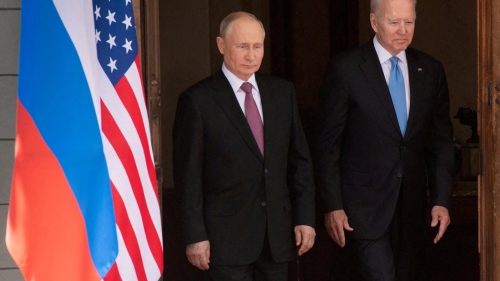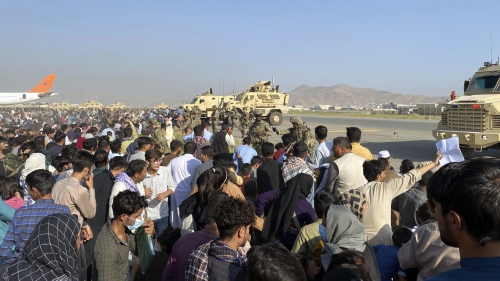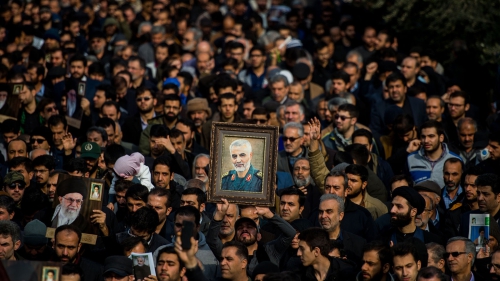Iraq - Purple or Still Black and Blue?
| Instead of engaging in publicity stunts by dying their fingers purple, members of Congress could better spend their time pushing the Bush administration to give the Iraqis a real chance to end the violence that is making their country black and blue. |
In the rich of tradition of "inside the beltway" political gimmicks, the all-too-giddy congressional Republicans at President Bush's recent State of the Union address dipped their fingers in purple ink to show solidarity with Iraqis who voted in the U.S.-initiated Iraqi election. That smugness will likely come back to bite them. The predictable voter turnout in various areas of the country portends a precarious future for a unified U.S.-like federation. In fact, in the future, such Republican crowing might well be ridiculed as much as the President's "Mission Accomplished" speech was after guerrilla warfare broke out in Iraq.
I admire the courage of Iraqis braving significant risks going to the polls, but the congressional Republicans, sitting safely in the U.S. Capitol thousands of miles away from the Iraqi violence, cared less about the Iraqis and more about scoring public relations points for the president against the Democrats in front of a nationwide TV audience. Those Republicans were as close to the dangers the Iraqis faced as armchair Super Bowl fans were close to the risk of injury on the field.
When armed guerrillas roam the countryside, even a free and fair democratic vote may be irrelevant to the outcome. According to a New York Times article from 1967, the Johnson administration was pleased as punch then about an 83 percent voter turnout in South Vietnamese elections. We all know how that conflict turned out: the majority went to the polls and the armed minority eventually went to the halls of power.
In Iraq, as in Vietnam, the key to peace and prosperity is to get the armed minority to cease committing acts of violence. To do that, the U.S. government must honestly examine why the Sunni insurgents are fighting. Instead, the president calls the rebels terrorists, criminals, and holdovers from Saddam's regime. In fact, although some of them fall into those categories, experts agree that most are average Sunnis battling the perceived foreign occupier and fearing that any new Shiite government would exact reprisals for years of oppressive Sunni rule. The insurgency wouldn't be nearly so effective without substantial support in the Sunni community.
If the president and the Republican Congress really wanted to do the Iraqi people a favor-after authorizing an unneeded invasion, which caused widespread chaos and violence against Iraqis-they would abandon the illusion that merely allowing the Iraqis to vote will eventually make them free and prosperous.
Iraq was carved out of three provinces of the defunct Ottoman Empire by the British in the 1920s and has been an artificial country ever since. The country, with fractious ethnic/religious groups, has been held together only by brute force. Saddam Hussein was only the latest in a long line of autocratic Sunni rulers and was brutal, in part, to hold the make-believe country together. If given a real choice-instead of the constrained option offered by a heavily armed occupying power to elect the leaders of a unified U.S.-like federation-Iraqis might want a looser confederation, with increased autonomy for various ethnic/religious groups, or even a partition of the country into separate states. Leading experts say that federations are usually unsuccessful when a society's ethnic/religious fissures are strong-as in the case of Iraq.
Genuine self-determination that would probably lead to such decentralized governance-accompanied by a rapid withdrawal of U.S. forces-would likely take the fire out of the insurgency. The foreign occupier would be gone and no strong central government would exist to threaten to oppress groups that didn't control it. Security could be provided locally, rather than nationally, using existing Kurdish and Shiite militias and insurgents converted to security forces in Sunni areas. Some argue that such decentralization would lead to a civil war because clean lines do not exist among the various groups in certain areas of the country-for example, in some large cities. But in a confederation, cities could compose their own autonomous units. Or if partition ensued, the areas in new states would not have to be contiguous. After all, Alaska, Hawaii, Puerto Rico, Guam, and the U.S. Virgin islands are not contiguous with the continental United States.
So instead of engaging in publicity stunts by dying their fingers purple, members of Congress could better spend their time pushing the Bush administration to give the Iraqis a real chance to end the violence that is making their country black and blue. Real freedom for the people of Iraq, which would most likely decentralize Iraqi governance, offers the best hope for long-term stability and prosperity there.
Ivan Eland is the Director of the Center on Peace and Liberty at the Independent Institute in Oakland, California and author of the book, Putting "Defense" Back into U.S. Defense Policy: Rethinking U.S. Security in the Post-Cold War World.
 |
New from Ivan Eland!
THE EMPIRE HAS NO CLOTHES: U.S. Foreign Policy Exposed
Most Americans don't think of their government as an empire, but in fact the United States has been steadily expanding its control of overseas territories since the turn of the twentieth century. In The Empire Has No Clothes, Ivan Eland, a leading expert on U.S. defense policy and national security, examines American military interventions around the world from the Spanish-American War to the invasion and occupation of Iraq. Buy It Today >>
Related Suggestions
On that note here's a thought. Let's see if they once again dip their fingers in purple ink, if Iraq includes "Islamic" in its name. Perhaps the same gesture, if that comes to pass, might tend to seem somewhat less shallow. (Jazak Allah kheir, for the idea.)
Was it really neccessary for the
Congressmen to dip their fingers in ink to
show solidarity? I feel that this was a shallow
act on their part.
Peace and Blessings

















